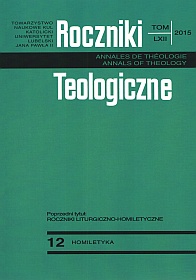Hermeneutics of Eschatological Texts in the Service of Liturgical Proclamation
Abstract
The article’s contents faces the issue associated with liturgical proclamation (preaching a homily) based on eschatological texts that are constructed on the richness of their syntactic-semantic meaning and theological and pragmatic contents. Just as achieving the desired results requires using the adequately chosen method of proceedings, so too the good, that is, theologically deep preparation of the homily can be achieved by the appropriate method of interpreting texts, treated as an inspirational source for liturgical proclamation. The intent of the study was to draw attention to the need to explain in homilies the wealth of the contents of eschatological texts (not just biblical texts included in the Mass readings in a given liturgical celebration). This is done for the benefit of using the methods of interpreting literary texts, which also includes the texts of the prayers of a particular Mass. The proposal contained in the article mentions the historical-critical method, which makes it possible to read the text according to the diachronic key that accurately acquaints us with the linguistic method (by theoretical description and re-ference to the example). This allows us to examine the text according to synchronous keys, subjecting it to syntactic, semantic and pragmatic analyses. An attempt to be more sensitive to the need to work on the contents of homilies based on the hermeneutic method discussed in the article is all the more timely since liturgical theology methods have already existed for some time. It is also worth using them based on homiletics and in the preparation of the homily to be preached during the liturgy, since the theological aspect should play an important role in homiletic preaching.
References
Augé M.: Programować homilię niedzielną. W: Wychowanie do liturgii i przez liturgię. Red. A. Żądło. Katowice 2012 s. 67-68. Kościół w Trzecim Tysiącleciu 10.
Augé M.: Tekst euchologijny. W: Liturgia w podstawowych formach wyrazu. Red. A. Żądło. Katowice 2011 s. 136-149. Kościół w Trzecim Tysiącleciu 9.
Augé M.: W poszukiwaniu metody hermeneutycznej w liturgii. „Studia Theologica Varsaviensia” 49:2011 nr 1 s. 57-73.
Cheno R.: L’homelie, action liturgique de la communauté eucharistique. „La Maison Dieu” 227:2001 s. 9-34.
Czerski J.: Analiza lingwistyczna przypowieści o niemiłosiernym dłużniku (Mt 18, 23-35). „Wrocławski Przegląd Teologiczny” 1:1993 nr 2 s. 27-38.
Czerski J.: Interpretacja tekstów biblijnych w liturgii. „Studia Theologica Varsaviensia” 49:2011 nr 1 s. 141-154.
Czerski J.: Metody interpretacji Nowego Testamentu. Opole 1997.
Czerwik S.: Pojęcie liturgii według dokumentów reformy soborowej i nowego Katechizmu Kościoła Katolickiego. http://www.kuria.gliwice.pl/index.php?option=com_content&view=article&id=1206:pojecie-liturgii-wedlug-dokumentow-reformy-soborowej-i-nowego-katechizmu-kosciola-katolickiego&catid=127&Itemid=730 (dostęp: 13.04.2015).
Kunzler M.: Liturgia Kościoła. Tł. pol. i oprac. L. Balter. Poznań 1999. Podręczniki Teologii Katolickiej 10.
Langkammer H.: Metody lingwistyczne. W: Metodologia Nowego Testamentu. Red. H. Langkammer. Pelplin 1994 s. 233-270.
Magnani P.: L’omelia, attualizzazione della Parola. „Liturgia” 44:2009 nr 6 s. 79-99.
Rusiecki J.: Typologie analizy syntagmatycznej w hermeneutyce liturgicznej. „Studia Theologica Varsaviensia” 49:2011 nr 1 s. 75-84.
Sobeczko H.J.: Pluralizm metodologiczny w nauce o liturgii. „Studia Nauk Teologicznych PAN” 2:2007 s. 251-270.
Sobeczko H.J.: Z problematyki metodologicznej teologii liturgicznej. W: Metodologia teologii praktycznej. Red. W. Przyczyna. Kraków 2011 s. 56-69.
Untener K.: Preaching Better: Practical Suggestions for Homilists. Mahwah 1999.
Vagaggini C.: Il senso teologico della liturgia. Saggio di liturgia teologica generale. Roma 1965(4).
Waznak R.: An Introduction to the Homily. Collegeville 1998.
Wysocka E.: Hermeneutyka. W: Encyklopedia pedagogiczna XXI wieku. T. 2. Red. T. Pilch. Warszawa 2004 s. 186-191.
Żądło A.: Bóg Ojciec w modlitwie liturgicznej Kościoła. „Homo Dei” 69:1999 nr 4 s. 67-75.
Żądło A.: Ermeneutica liturgica. Strumenti per una dialettica culturale. „Rivista Liturgica” 98:2011 nr 3 s. 471-484.
Żądło A.: Hermeneutyka tekstów euchologijnych w kluczu diachronicznym i synchronicznym. „Studia Theologica Varsaviensia” 49:2011 nr 1 s. 85-97.
Żądło A.: Hermeneutyka w badaniach nad formułami modlitw liturgicznych. W: Studia Liturgiczne. T. 11: Badania nad liturgią w Polsce po Vaticanum II. Historia – kierunki badań – metodologia. Red. Cz. Krakowiak, W. Pałęcki. Lublin 2015 s. 81-113. Prace Wydziału Teologii 168.
Żądło A.: „Lex orandi – lex credendi” w modlitwach nad darami Adwentu w Mszale Pawła VI. Katowice 2013 s. 19-63. Kościół w Trzecim Tysiącleciu 11.
Żądło A., Calvano C.: Analisi linguistica e retorica di testi eucologici del Missale Romanum. Applicazione del modello stratigrafico. „Rivista Liturgica” 89:2002 nr 4-5 s. 593-612.
Żądło A., Calvano C.: Un modello di analisi sintattica e semantica dei testi del Missale Romanum. „Rivista Liturgica” 93:2006 nr 5 s. 803-820.
Copyright (c) 2015 Roczniki Teologiczne

This work is licensed under a Creative Commons Attribution-NonCommercial-NoDerivatives 4.0 International License.





